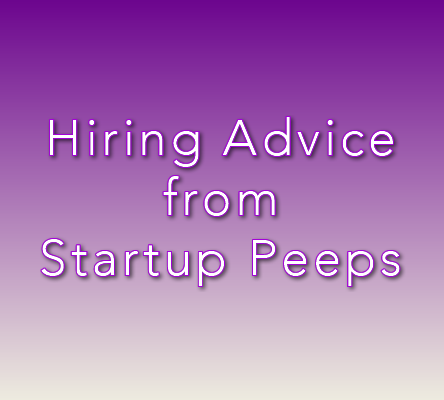It’s Feedback Friday here on the RC blog, and we have some hiring snippets from startup founders for the readers out there. Enjoy and have a great weekend.
I have hired over 100 people at 4 startups. Here’s my advice. 1. Contract to hire. Hiring a contractors first, allows you to test the water before jumping right in. It’s also much more cost efficient. You don’t contractors when their not busy working, and you don’t have to pay benefits. 2. Be honest. If you sugarcoat a job description you may experience high turnover when they realize the job was not what they expected. 3. MOST IMPORTANTLY, give new employees incentive pay when the company does well. In other words, if the company makes more money so should they. If they ask for $50,000 per year offer them $60; however, give them a $40,000 base and give them the remaining $20 in incentive and bonuses.
Marvin Russell CEO/Founder of MySiteAuditor
I run a startup and have hired several employees over the years. As a startup (without VC funding) I’ve had to be very careful about hiring the right person and I’ve been really lucky. One thing I do is to find someone I either know myself or is recommended by a close friend. That way I already know their personality and work habits. I also rarely even look at a resume, but instead hire curious problem solvers, who are also self starters. Startups need to be nimble enough to turn on a dime if they need to, and I like hiring people who are good improvisors. They are well worth the money. One thing employees who have never run their own business need to understand is that they need to bring value to a company. Payroll is one of our biggest expenses and it has to be well spent.
Here are 3 major lessons I learned from personal experience about startup hiring:1.. Prioritize generalists over specialists.In startups, it is common that all employees will need to wear many hats. As such, I like to bring add members with diverse backgrounds to our team who can quickly add value in different ways, and I emphasize the importance of fast learning throughout the recruitment process.2. Know the goals of new and/or prospective hires.During interviewing and on boarding, it’s important to get a feel for where new hires see themselves and how they anticipate their futures. Identify their short and long term career goals to gain insight into how you can retain them and what roles they may grow into as your startup grows.3. Get proof in your interview processIntegrate a test of skill into your interview process. For example, ask an aspiring social media strategist to come in with a short deck on Pinterest strategy, or have a prospective sales associate prepare a brief pitch. This will show you how they think about their work and if they recognize any challenges unique to your business or industry, giving you an additional data point before you make an offer.
